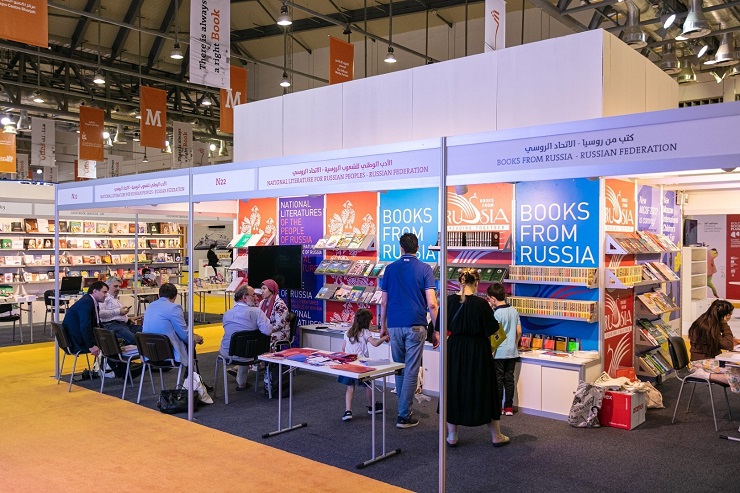Russia recently took part in the Sharjah International Book Fair, the largest one in UAE. The exposition featured books published in the Russian Federation, which included Arabic. Russian representatives held talks with the Emiratis to launch a major joint project, translating and publishing a series of Russian classical and modern literature into Arabic.
There was considerable interest shown. Taleb Alrefai, a Kuwaiti writer, honored with the SIBF 2021 ‘Cultural Personality of the Year,’ said that after reading the novel Mother by Maxim Gorky, he discovered a new world of people looking into the future. This discovery prompted him to get acquainted with the works of other Russian luminaries and inspired him to become a writer.
It’s worth noting that the first masterpieces of Russian literature translated into their native language for the Arabs appeared in the 19th century. The Russian literature was translated by their compatriots, who later worked at the Universities of the Russian Empire.
The Russian literary word actively penetrated the Arab region from the middle of the twentieth century as the USSR developed multifaceted relations and ties with independent states. The well-known state publishing houses at that time were Progress, Raduga, Mir, and Nauka, which published hundreds of works by Russian writers and authors from the national republics in Arabic.
A galaxy of talented translators, graduates of Soviet Universities, and citizens of Arab countries have grown up. Thanks to their efforts, the local reader gained access to the rich and varied heritage of the Russian classics. Many prominent writers and critics of the region contributed to the popularization of their work. For example, each of half a dozen writers and novelists of Iraq who lived in the twentieth century has translated into his native language works by Tolstoy, Dostoevsky, Turgenev, Gogol, Chekhov, Gorky, and other prominent authors from Russian or other foreign languages.
The Government Inspector, a play by Nikolai Gogol, was staged in almost all Arab countries on a professional or amateur level.
Russian drama significantly influenced the birth and formation of the Syrian theater. According to Tamer Al-Arbid, a theater figure of the Syrian Arab Republic, the texts and plots entered the national repertoire of the country, becoming popular with the audience. After all, the heroes of the plays of the classics are ordinary people. Their problems and aspirations, in contrast to the propagated Western values, resonate with modern Syrians.
Several Egyptian films were shot based on scripts inspired by the works of Russian writers, such as Sonya and The Madman, a film based on the novel Crime and Punishment, Brothers-Enemies, created under the influence of The Brothers Karamazov, River of Love, an adaptation of the novel Anna Karenina, etc.
Today, in a multipolar and global world, the country’s image is associated with economic indicators and the level of culture and literature. Western countries are actively promoting the publication of their authors and the teaching of languages in the Third World. For these purposes, significant funds are spent through media channels, social networks, and the organization of various exhibitions.
The struggle for cultural influence in the region is increasingly acquiring political overtones. The years following the collapse of the Soviet Union have shown that translations of books by Russian writers cannot make their way into the book markets of the Arab world without government support. Therefore, the Institute for Literary Translation, Moscow, established to support Russian literal translations, is relevant, as it assists Arab publishers in producing works by Russian authors.
The traditions of Russian-Arab cultural and literary interaction, which are essential for mutual perception and dialogue between Russia and the Arab countries, continue to live on. In Egypt, two books of memoirs of Fyodor Dostoevsky’s contemporaries were recently published on the occasion of the 200th anniversary of the great writer’s birth. Previously, the Center for Strategic Studies in Cairo held a seminar on the influence of a writer on the local literary community.
The Egyptian-Russian Foundation for Culture and Science, which has existed since 2015, has published a series of translations of Russian masters and contemporary writers. Among them are the works by Anton Chekhov, the Russian poetry collection. It presents almost 30 authors, from Zhukovsky to Yevtushenko and Okudzhava, collected poems, previously translated and new ones.
The Association of Egyptian Researchers, whose goal is to popularize modern knowledge and world culture, lists two dozen books by Russian authors who “contributed to the treasury of world literature, which everyone ought to read.”
Idriss Magliani, a Moroccan poet and translator, has been an honorary member of the Union of Writers of Russia since 2016 for his services in the translation and popularization of Russian authors. Idriss Magliani translated Pasternak, Pushkin, Yevtushenko, and other authors into Arabic. Tales by Alexander Pushkin and Pavel Bazhov, translated, are now being prepared for publication in the Emirates.
So the Russian literary word still finds its fans and judges in different parts of the Arab world.
Yury Zinin, a senior researcher at the Center for Middle Eastern Studies of Moscow State Institute of International Relations (University) of the Ministry of Foreign Affairs exclusively for the online magazine “New Eastern Outlook”.

